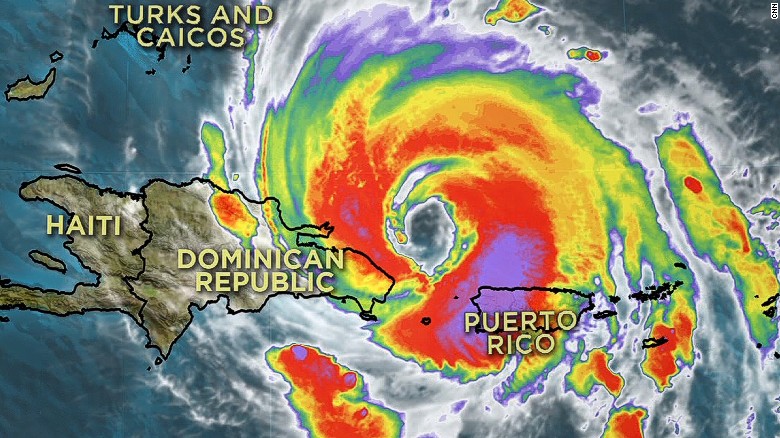Puerto Rico's death toll from Hurricane Maria has been hotly debated since the Hurricane hit on September 20th of 2017. Initial death counts were reported at around 16-60 people (depending on the source); However, later reports that are just beginning to surface have shown the death toll to be in excess of four thousand people. As reported in the Times Editorial article titled "The Shame in Puerto Rico," the Editorial Board briefly mentions the inequality of Puerto Rico as a commonwealth as reason for the lack of aid after the hurricanes. This inequality is evident especially when President Trump is quoted saying, "I'd be very proud that only 16 people had died...unlike the toll in a 'real catastrophe' like Katrina, which took 1,833 lives".
 |
| Hurricane Maria as a CAT 3 via CNN |
So why has it taken the Mayor of San Juan, Carmen Cruz, becoming the voice of Puerto Rican's for the US to start listening. Recently, Mayor Cruz lashed out at President Trump saying that Hurricane Maria opened her eyes "to our inequity- and our inequality." For the longest time, the US has treated Puerto Rican's as second class citizens and this disaster seemed to be the tipping point. Looking back at the nominal relief efforts provided by the United States, one can clearly see the numerous ways the US failed in this past year alone.
- $30 million paid for tarps and emergency supplies that were never delivered.
- 30 million MRE's were ordered, but only 50,000 were delivered.
- $17 billion was requested to fix Puerto Rico's power grid, but only $2 billion was supplied.
All in all, the lack of emergency relief efforts is hardly the first time the US has treated Puerto Ricans as second-class citizens. By keeping Puerto Rico as a commonwealth, the US continues to assert its dominance. Repeatedly telling US citizens that they ARE citizens, but denying them equal representation and voting rights wouldn't be tolerated in any US state. So why allow Puerto Rican's this injustice? They are able to vote in primaries, but not the Presidential Election. They are also allowed to vote year after year on their status as a commonwealth or be granted statehood. Although their election for statehood has historically been corrupt, their most recent vote was overwhelmingly in favor of statehood.
In the past, I can understand Puerto Rican's distrust in becoming a US state. After being savagely colonized by Spain and then "saved" by the United States (read: savagely re-colonized), staying a territory allows Puerto Rico some independence. Would their independence increase after becoming the 51st state? I'm not sure- and I'm not sure whether many people know the true answer either. However, I do know that there is a general ignorance around Puerto Rico's status in general. Most people don't realize that the territory is STILL in poor condition 9 months after the hurricanes, or that Puerto Rican's are US citizens.
In the past, I can understand Puerto Rican's distrust in becoming a US state. After being savagely colonized by Spain and then "saved" by the United States (read: savagely re-colonized), staying a territory allows Puerto Rico some independence. Would their independence increase after becoming the 51st state? I'm not sure- and I'm not sure whether many people know the true answer either. However, I do know that there is a general ignorance around Puerto Rico's status in general. Most people don't realize that the territory is STILL in poor condition 9 months after the hurricanes, or that Puerto Rican's are US citizens.
Let me mention an encounter I overheard the other day that highlights the ignorance. Just the other day, I was in a waiting room and overheard a conversation between a white woman in her 30's and a Puerto Rican couple. The lady asked, "Was it hard to come here legally" and "So I guess you guys have your green card then". The ignorance doesn't stop there, however, but circles back to the US's shameful coverage of Puerto Rico. Perhaps there is a lack of coverage because the degree of separation is too much. If people in the US don't view Puerto Ricans as citizens, why should they care? There is a dangerous ideology of "it didn't happen to me, why should I care" that I believe is at the forefront of this issue. Until this ideology becomes less prominent, I don't see the US taking much interest in Puerto Rico's rising death toll.
Comments
Post a Comment